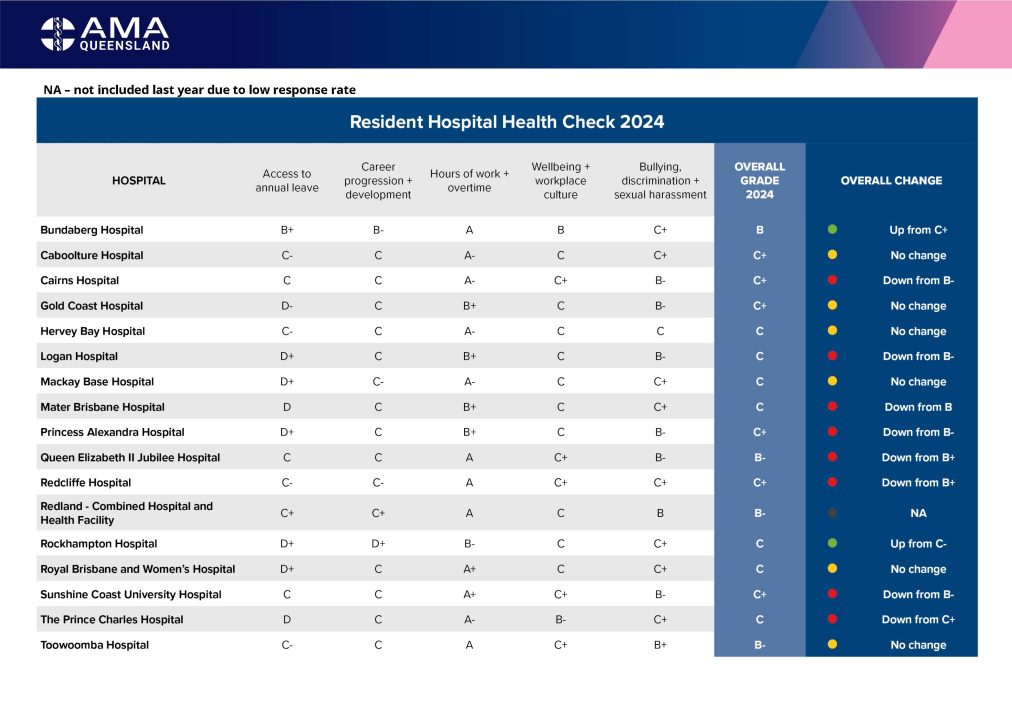In Queensland hospitals, doctors-in-training continue to feel they will be targeted if they report negative incidents. See which hospitals are the worst.
Almost half of Queensland’s junior hospital doctors are scared they are so fatigued by overwork that they will make a clinical error that impacts a patient, says a new report.
The annual Resident Hospital Health Check report, published by the AMA Queensland and the state branch of the Australian Salaried Medical Officers Federation, also found that almost a third of the doctors don’t feel safe at work.
And, in an alarming result, 81% of the 831 respondents said they feared negative consequences for their career if they reported an incident. That’s up from 75% just a year ago.
“We cannot afford to have a new generation of doctors coming up who are afraid to report bad behaviour,” AMA Queensland President Dr Nick Yim said.
“AMA Queensland and ASMOFQ will take these survey results to the new government and demand change.
“We met with every hospital and health service following last year’s RHHC to outline the results and offer practical actions to address issues. These meetings were positive and led to good outcomes.
“We will do the same with these results.”
The safety and fatigue issues are ongoing problems that have seen little change.
“This is the fourth consecutive year that about 30% of doctors in training have reported safety concerns at work and the seventh that about 50% have reported fears of making a fatigue-based error,” said AMAQ Committee of Doctors in Training chair Dr Elise Witter.
“It is beyond disappointing that we are not seeing any change in these statistics. Everyone deserves to feel safe at work.
“What we are hearing from our junior doctors, particularly those on ward call overnight, is that they do not feel safe walking between hospital buildings.
“Disturbingly, 50% of junior doctors are already feeling some form of burnout.
“We clearly need better workforce retention strategies and incentives to keep these doctors in the profession they have studied and worked so hard for.”
The survey of 831 doctors in training at hospitals across the state found a decrease in respondents reporting experiencing or witnessing bullying, discrimination or harassment – down to 35% in 2024 from 48% two years earlier.
Dr Jillann Farmer, CEO of A Better Culture, said safety at work was a “critical, unaddressed issue” for healthcare staff.
“That includes both physical and psychosocial safety.
“While it’s good to see rates of reported bullying harassment and discrimination go down, the base numbers are still far too high.
“It’s going to take concerted, comprehensive effort, but its critical to the future of healthcare to have a healthy, thriving workforce. This data highlights just how at-risk that workforce is.”
Of the 17 hospitals employing respondents to the survey, not one received a B+ or better for their overall grade – comprised of a combined score from five performance measures including access to annual leave, career progression and development, hours of work and overtime, wellbeing and workplace culture, and bullying, discrimination and sexual harassment.

The best ranked hospital in the state, as far as junior doctors are concerned, was Bundaberg Hospital which finished the year with a B, up from a C+ the year before.
Seven hospitals tied for the bottom of the ladder with Cs – Hervey Bay, Logan, Mackay Base, Mater Brisbane, Rockhampton, Royal Brisbane and Women’s and The Prince Charles.
Of those only Rockhampton had improved, up from a C- in 2023.
Logan and Mater Brisbane had dropped their grades, while the others had remained the same.
Some hospitals, according to the report, discouraged their junior doctors from taking part in the survey.
While doctors from 40 hospitals completed the survey, only 17 hospitals had enough participants to be statistically valid and included.
“Many hospitals actively encouraged their junior doctors to take part in this survey. We thank them for their commitment to finding out what their doctors in training are experiencing and what can be improved,” Dr Yim said.
“However, it is extremely disappointing that bureaucrats at some of our biggest hospitals actively discouraged their doctors from taking part, presumably because they feared what our survey would find.
“This points to a culture of cover-up and cowardice – the exact behaviours that we are attempting to identify and fix through this survey.
“We want a culture of active feedback and reporting without fear of repercussion for our doctors to ensure that we can continually improve our healthcare system and service to our communities.”
There was a drop in respondents reporting being fully paid for claimed overtime and 19% reported they had been advised not to claim overtime.
“ASMOFQ fights hard for the working conditions and rights of all hospital doctors, and it is critical that overtime and fatigue are managed for junior doctors,” ASMOFQ president Dr Hau Tan said.
“They have just started their careers and are vulnerable to bullying, discrimination and harassment.
“With a new Queensland government coming to power and the next medical officer certified agreement negotiation period about to commence, now is the time for the health minister to commit to improving the working conditions of junior doctors.
“ASMOFQ will continue to support and advocate for doctors to ensure their workplaces are safe and their working conditions are protected.”
Read the full report online.



